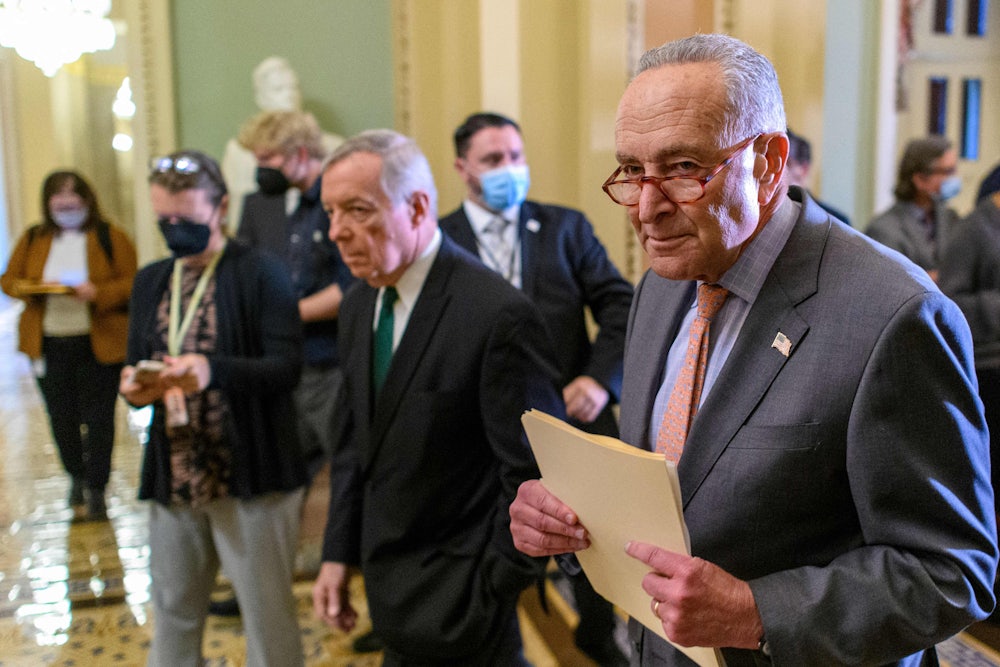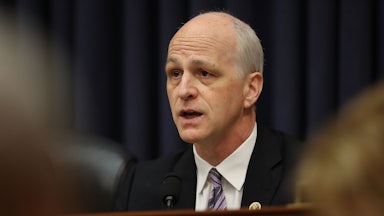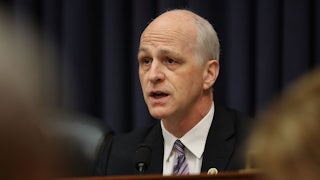The Senate is poised to vote on a massive and consequential bill this week, as it scrambles to address several outstanding legislative issues ahead of an end-of-year crunch. No, no, not that bill: The Senate is not yet able to take up the Build Back Better Act, the nearly $2 trillion social spending measure that Democrats are frantically trying to pass. Instead, the world’s greatest deliberative body is swooping in on a matter that’s considered far more mundane in Beltway circles, despite its hefty price tag: this year’s edition of the National Defense Authorization Act, or NDAA, which amounts to $768 billion in spending.
The president’s big social spending bill will have to wait its turn. The Senate, in any event, cannot yet take up the Build Back Better Act, because it has yet to be voted on in the House. After a brouhaha over timing earlier this month, the House agreed to take up the bill this week. House lawmakers are currently waiting for the Congressional Budget Office to finish its ministrations on the fiscal impact of the bill—and the possibility that its verdict may prompt renewed negotiations of the bill’s top line. So while we wait for the people’s house to sort through all of that, the Senate is moving on to other priorities.
The House approved its version of the annual defense policy bill in September, but the measure has languished in the upper chamber since the Senate Armed Services Committee approved its version in July. Senate Majority Leader Chuck Schumer has received bipartisan criticism for not bringing the bill to the floor earlier, including from House Armed Services Committee Chair Adam Smith, a Democrat. But with the end of the year looming and several other priorities to contend with, including the Build Back Better Act, funding the government, and the return of the debt ceiling crisis, the Senate may finally take action on the NDAA and cross it off this hefty to-do list.
In a Sunday letter to the Democratic caucus, Schumer announced that the Senate would “likely” take up the NDAA this week, as it waits for the House to pass the Senate’s version of the Build Back Better Act. He filed cloture on the bill on Monday evening; passing the NDAA is a typically bipartisan endeavor, and it is expected to clear the necessary 60-vote threshold to advance. But there are some further twists in the tale: Schumer also said that the Senate may add two other bills to the NDAA—the U.S. Innovation and Competition Act and a repeal of the Authorization for Use of Military Force in Iraq.
The former bill, known as USICA, is a bipartisan measure aimed at increasing competitiveness with China and strengthening American supply chains. It is a particular priority for Schumer. It passed in the Senate in June but has not yet been acted upon by the House, to the consternation of its supporters in the Senate.
“I have had a number of conversations with Senators on both sides of the aisle and there seems to be fairly broad support for doing so, which would enable a USICA negotiation with the House to be completed alongside NDAA before the end of the year,” Schumer said in his letter.
A vote on USICA may also be politically beneficial for Democrats, who have been confronted with a slew of recent negative headlines about how supply chain issues may ruin Christmas. “The funding and policies included in USICA will help alleviate the supply chain challenges facing our small business and consumers on a daily basis, making its passage this year critical,” Schumer said.
Senator Mark Kelly, one of the co-sponsors of USICA, said that he believed it was a “good idea” to add the bill to the NDAA. “It’s a national security issue. So it makes sense to me that it would be part of the NDAA,” Kelly told The New Republic.
There may be some procedural issues with adding USICA to the NDAA. The Constitution requires that all bills raising revenue originate in the House, and USICA is a revenue bill. But Senate leadership is working with the speaker’s office to resolve any procedural issues with adding USICA to the NDAA, a Senate Democratic aide said. Speaker Nancy Pelosi also met with committee chairs on Monday evening “to discuss next steps on this topic in terms of House legislation,” a source familiar told TNR.
Representative Ro Khanna, who introduced the companion bill to USICA in the House, told TNR that he was “closely working with Senator Schumer and his team to get the key provisions in the NDAA.”
“This will be the largest investment in science and tech since the Cold War. The Senate passed this months ago. It’s time the House delivers,” Khanna said.
Schumer had also promised to hold a vote on a bill repealing the Authorization for Use of Military Force in Iraq, or AUMF, before the end of the year. “I made a commitment to having a vote on this proposal in 2021 and the NDAA is a logical place to have that vote,” Schumer said in his letter. The House has already approved its versions of bills repealing the 1991 and 2002 authorizations.
Senator Tim Kaine, who introduced the bill to repeal the AUMF, told TNR that it was a “great idea” to include it in the NDAA. “I think we have over 60 votes that we can count, and there are a number of people who haven’t yet declared who I think we might pick up,” Kaine said. He added that while he would have preferred to have a standalone vote on the bill, “the calendar is so crowded between now and the end of the year.”
“I think it’s a step in the right direction. There’s still more steps that we need to take,” Kaine said.
The NDAA, which as lawmakers are quick to brag, has passed annually for 60 years, is usually swamped by hundreds of amendments. Only a fraction of these amendments will typically receive votes, and many of them are either brought for political messaging purposes or are last-ditch attempts by lawmakers to include their policy priorities in one of the few bills that is guaranteed to sail through both houses to arrive at the president’s desk.
It’s unclear which amendments will receive votes and when final passage will take place. But Senate Minority Leader Mitch McConnell indicated that he wanted a thorough process. “The Senate will need to have the robust bipartisan floor process that is customary for this important bill. And we’ll need to leave extraneous items on the sidelines,” McConnell said.
This year’s bevy of amendments addresses a host of issues, including dueling proposals to conduct a review of the war in Afghanistan, a Republican amendment to block the Defense Department from enforcing vaccine mandates, a proposal to federally legalize medical marijuana for veterans, and the creation of a pilot program to provide plant-based protein options at two Navy forward operating bases. Other amendments include one to relocate any chimpanzees on military bases to a sanctuary in Louisiana and one to give the mayor of D.C. purview over the D.C. National Guard, instead of the president. Some of these amendments are quite significant in scope, such as the 2022 intelligence authorization bill that Senate Intelligence Committee Chair Mark Warner filed as an amendment, which was approved by his committee in July.
Senator Bernie Sanders has also introduced an amendment to reduce the amount of spending authorized by the bill, which will almost certainly fail. The House version of the bill increased the amount authorized by roughly $24 billion to match the Senate version, a controversial provision that saw opposition from some Democrats. Both the House and Senate versions dedicate more to defense spending than was requested by the Biden administration, in spite of the fact that one major expenditure—the War in Afghanistan—has been wound down.
The annual ritual of passing the NDAA routinely raises questions about how much the United States is spending on defense. The Senate bill authorizes $768 billion in spending between 2022 and 2026, a 5 percent increase compared to the amount appropriated for defense in 2021, according to the Congressional Budget Office. It would “increase outlays by $741.7 billion over the 2022–2026 period,” CBO reported. By comparison, the office has not yet released a score for the Build Back Better Act, but the White House estimates that it will cost nearly $2 trillion over 10 years, which the Biden administration argues would be covered by a sufficient revenue stream.
The U.S. spends more on nondefense than on defense in its discretionary spending, and mandatory spending far outstrips discretionary spending. In fiscal year 2020, the U.S. spent $1.6 trillion, or 7.8 percent of its gross domestic product, on discretionary spending, which can be appropriated by Congress. Of that, $714 billion was spent on defense and $914 billion on nondefense programs. But U.S. spending on defense is still far greater than other countries’; by one estimate, the U.S. spends more on defense than the next 11 countries combined. In 2020, U.S. defense spending accounted for 39 percent of global military spending, according to the Stockholm International Peace Research Institute.
If the Senate passes the NDAA, it will have to conference with the House to reconcile the differences between the two bills, adding another task to Congress’s list of end-of-year priorities. In his letter, Schumer acknowledged that the Senate would likely have to vote on a continuing resolution, or C.R., to keep the government funded; Congress had previously voted on a C.R. extending funding through December 3. Democrats and Republicans have been unable to reach an agreement on a top-line number for appropriations for fiscal year 2022.
Although the Senate will not be taking direct action on the Build Back Better Act this week, Schumer said that relevant committees and his office were working with the Senate parliamentarian on a so-called “privilege scrub.” Democrats are attempting to pass the bill through reconciliation, a complicated process defined by incomprehensible jargon. There are strict rules for using reconciliation, and those rules are subject to the Senate parliamentarian’s interpretation. The privilege scrub ensures that the House bill is in compliance with reconciliation rules and therefore can maintain its “privileged” status in the Senate. After the House passes its bill and the CBO offers its score, the Senate can move forward with what lawmakers call the “Byrd Bath” process, which identifies any provisions that may break the arcane budgetary rules. (As your eyes have almost certainly glazed over, I shall leave this explanation to stand for now and give myself the option to revise and extend it in a future article.)
Once you add the need to raise the debt limit before the country defaults on its debts and precipitates a possible global financial calamity, you are left with a sad legislative advent calendar of priorities to address before the end of the year. “I ask that you please keep your schedule flexible for the remainder of the calendar year. As you can see, we still have much work to do to close out what will be a very successful year of legislative accomplishments. I am confident we can get each of these important items done this year, but it will likely take some long nights and weekends,” Schumer said in his letter to colleagues, sentences that were almost certain to elicit groans from senators, their overworked staffers, and exhausted reporters alike.










